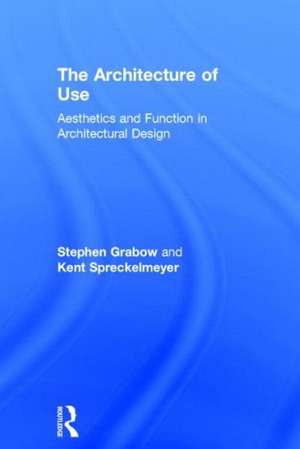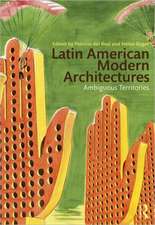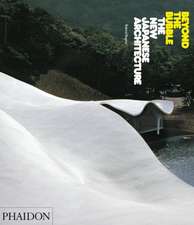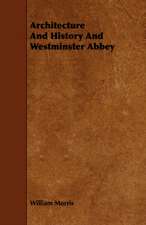The Architecture of Use: Aesthetics and Function in Architectural Design
Autor Stephen Grabow, Kent Spreckelmeyeren Limba Engleză Hardback – 8 dec 2014
Each building is described from the point of view of a major functional concept or idea of human use which then spreads out and influences the spatial organization, built form and structure. In doing so each building is presented as an exemplar that reaches beyond the pragmatic concerns of a narrow program and demonstrates how functional concepts can inspire great design, evoke archetypal human experience and help us to understand how architecture embodies the deeper purposes and meanings of everyday life.
| Toate formatele și edițiile | Preț | Express |
|---|---|---|
| Paperback (1) | 457.76 lei 6-8 săpt. | |
| Taylor & Francis – 8 dec 2014 | 457.76 lei 6-8 săpt. | |
| Hardback (1) | 1328.55 lei 6-8 săpt. | |
| Taylor & Francis – 8 dec 2014 | 1328.55 lei 6-8 săpt. |
Preț: 1328.55 lei
Preț vechi: 1620.19 lei
-18% Nou
Puncte Express: 1993
Preț estimativ în valută:
254.21€ • 265.42$ • 210.40£
254.21€ • 265.42$ • 210.40£
Carte tipărită la comandă
Livrare economică 04-18 aprilie
Preluare comenzi: 021 569.72.76
Specificații
ISBN-13: 9780415843010
ISBN-10: 0415843014
Pagini: 210
Ilustrații: 50 halftones and 35 line drawings
Dimensiuni: 156 x 234 x 18 mm
Greutate: 0.5 kg
Ediția:New.
Editura: Taylor & Francis
Colecția Routledge
Locul publicării:Oxford, United Kingdom
ISBN-10: 0415843014
Pagini: 210
Ilustrații: 50 halftones and 35 line drawings
Dimensiuni: 156 x 234 x 18 mm
Greutate: 0.5 kg
Ediția:New.
Editura: Taylor & Francis
Colecția Routledge
Locul publicării:Oxford, United Kingdom
Public țintă
Postgraduate and UndergraduateCuprins
Preface: The Art of Use Foreword: The Use of Art Juhani Pallasmaa 1. Introduction 2. The Architecture of Health: The Paimio Sanatorium 3. The Shape of Work: The Larkin Office Building 4. Homo Ludens: The Amsterdam Orphanage 5. The Form of Commerce: The National Farmers Bank 6. The Structure of Memory: The Trenton Bath House 7. The Function of Wisdom: Mount Angel Abbey Library 8. An Architecture for Liberal Religion: Unity Temple 9. Street-Corner Musicians: The Berlin Philharmonie 10. Pictures at an Exhibition: The Louisiana Museum 11. Community and Privacy: Siedlung Halen 12. Conclusion Acknowledgments Bibliography Illustration Credits Index
Notă biografică
Stephen Grabow is Professor of Architecture at the University of Kansas. He is the recipient of fellowships from the National Endowment for the Humanities, the National Endowment for the Arts and the American Fulbright Commission. He was educated in architecture at the University of Michigan and at Pratt Institute, in landscape architecture at the University of California at Berkeley and holds a doctorate in urban planning from the University of Washington.
Kent Spreckelmeyer is Professor of Architecture at the University of Kansas. He is a Fellow of the American Institute of Architects and the recipient of a Kemper Teaching Fellowship and numerous grants in the field of healthcare planning. He was educated in architecture at the University of Kansas and at University College, London and holds a doctorate in architecture from the University of Michigan.
Kent Spreckelmeyer is Professor of Architecture at the University of Kansas. He is a Fellow of the American Institute of Architects and the recipient of a Kemper Teaching Fellowship and numerous grants in the field of healthcare planning. He was educated in architecture at the University of Kansas and at University College, London and holds a doctorate in architecture from the University of Michigan.
Recenzii
'A timely elucidation of the poetics of use as the fundamental ground on which any architecture of lasting value must be built. The ten works examined exemplify the fusion of the practical and the poetic, remove our focus from exterior form to the inhabited space within, and reveal that a building's most important use is to enrich our experience and enhance the life that takes place in it.' - Robert McCarter, Ruth and Norman Moore Professor of Architecture, Washington University in St. Louis, USA
'In this provocative and well-documented book, Grabow and Spreckelmeyer argue that conventional definitions of functionalism should be expanded, thus enriching our appreciation of significant works of modern architecture.' - David G. De Long, Professor Emeritus of Architecture, University of Pennsylvania, USA
'Compelling in its arguments and clear in its exposition, this book resituates the concept of use at the center of architectural theory and practice where it belongs. Through discussions of literary texts, paintings, music, and cultural history, we see how the art of building can not only accommodate the patterns of our lives but give them legible and beautiful expression.' - David Leatherbarrow, Professor and Chair, Graduate Architecture Group, University of Pennsylvania, USA
'This wonderfully clear-headed book serves as an antidote to the empty formalism of so much of today’s architectural avant-garde. Grabow and Spreckelmeyer show, in ten eloquent case-studies, how great architecture arises out of an elevated understanding of human activities and social relationships; and how the best buildings don’t just function, but inspire us to do and to be well. This book demonstrates how the meaning of buildings often comes from the institutions they house, providing architecture with its content as well as its contents.' - Thomas Fisher, Professor of Architecture and Dean, College of Design, University of Minnesota, USA
'A pair of well-credentialed architecture professors, Grabow and Spreckelmeyer (both, Univ. of Kansas), aim a pair of much-needed barbs at the profession’s stars and their boosters and wannabes: pay greater attention to functions than to novel forms, and make well-functioning buildings pleasant places to be. Summing Up: Recommended. All readership levels.' – CHOICE, C. W. Westfall, University of Notre Dame
'In this provocative and well-documented book, Grabow and Spreckelmeyer argue that conventional definitions of functionalism should be expanded, thus enriching our appreciation of significant works of modern architecture.' - David G. De Long, Professor Emeritus of Architecture, University of Pennsylvania, USA
'Compelling in its arguments and clear in its exposition, this book resituates the concept of use at the center of architectural theory and practice where it belongs. Through discussions of literary texts, paintings, music, and cultural history, we see how the art of building can not only accommodate the patterns of our lives but give them legible and beautiful expression.' - David Leatherbarrow, Professor and Chair, Graduate Architecture Group, University of Pennsylvania, USA
'This wonderfully clear-headed book serves as an antidote to the empty formalism of so much of today’s architectural avant-garde. Grabow and Spreckelmeyer show, in ten eloquent case-studies, how great architecture arises out of an elevated understanding of human activities and social relationships; and how the best buildings don’t just function, but inspire us to do and to be well. This book demonstrates how the meaning of buildings often comes from the institutions they house, providing architecture with its content as well as its contents.' - Thomas Fisher, Professor of Architecture and Dean, College of Design, University of Minnesota, USA
'A pair of well-credentialed architecture professors, Grabow and Spreckelmeyer (both, Univ. of Kansas), aim a pair of much-needed barbs at the profession’s stars and their boosters and wannabes: pay greater attention to functions than to novel forms, and make well-functioning buildings pleasant places to be. Summing Up: Recommended. All readership levels.' – CHOICE, C. W. Westfall, University of Notre Dame
Descriere
Analyzes ten buildings embodying the human experience and clarifies that function in architecture is a generative force in determining built form.













